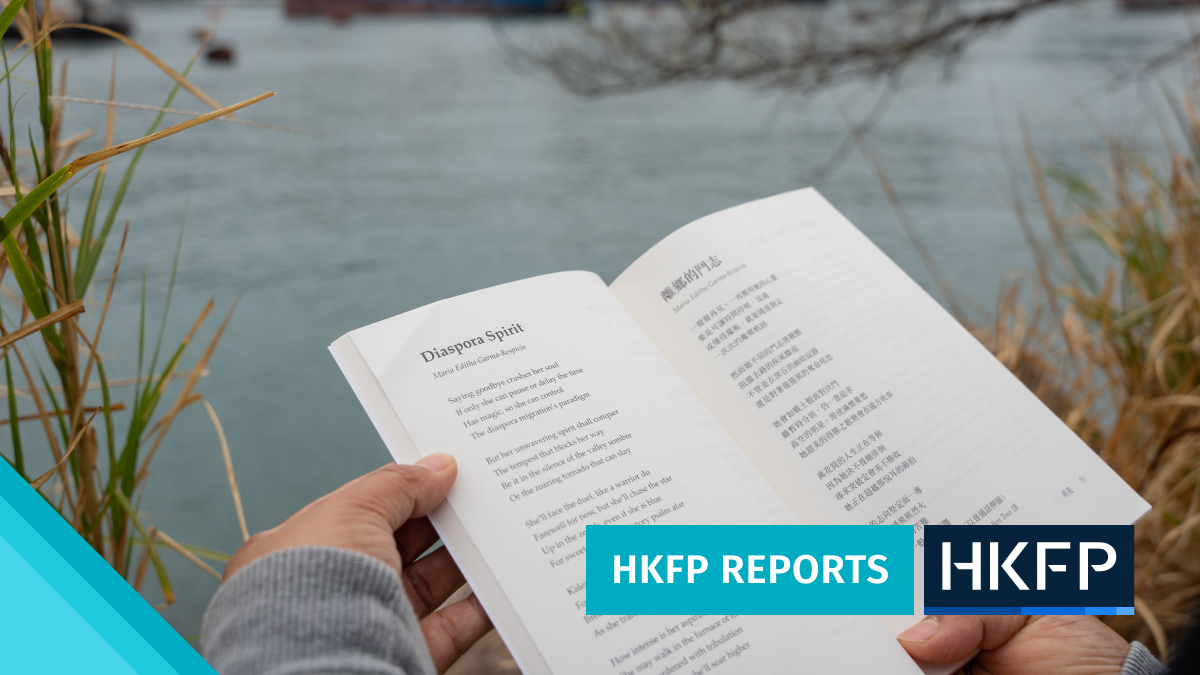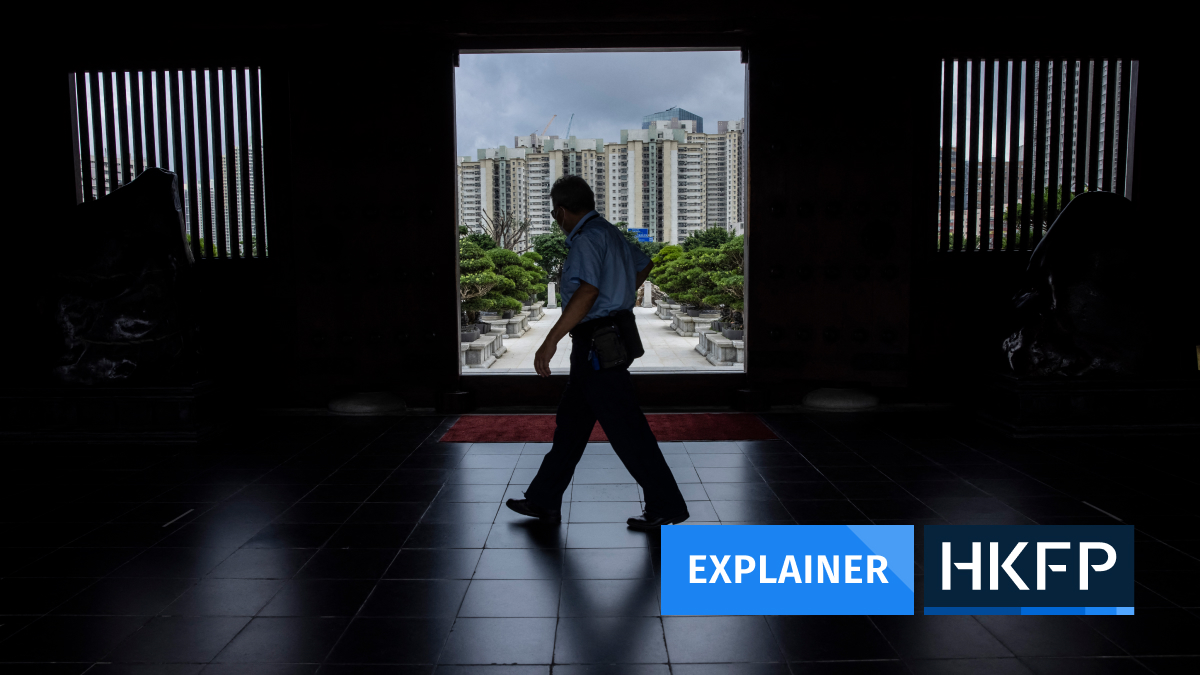Inside a pitch-black underground drainage tunnel not far from a Hong Kong public housing estate, Countryside Volunteer Search Team (CVST) members Tai Wai-hung and Dixon Chan turned on their small flashlights and began chanting “Uncle Chan! Uncle Chan!”

The echo reverberated through the expansive tunnel as the pair carefully inspected the surroundings for any traces of the 71-year-old, who disappeared after leaving his home nearby more than a year ago.
Their repeated calls yielded nothing but silence. There were piles of suitcases and other random objects such as a wooden table and a car tyre, but no sign of the missing man.
Despite knowing the search was a long shot, Tai and Chan told HKFP they would keep revisiting old cases when they had time, in hopes of bringing peace to family members. Apart from such tunnel searches, they often take to the hills to look for missing hikers.

“People often ask why we do [voluntary searches]. Family members may not have the ability to climb hills or walk through dense forests, but we do,” said Tai during a search in early November.
‘Assisting role’
The CVST, founded by a group of hiking enthusiasts in September 2005, is one of Hong Kong’s most active community groups helping to find people who go missing in the countryside.
The city is famed for its signature skyscraper skyline. But 40 per cent of its area is made up of rugged and mountainous country parks, often densely vegetated.

CVST members took part in a high-profile hunt last month for a 17-year-old school student, who was found alive in a country park after being reported missing for around a week.
At present, CVST has more than 100 registered volunteers and around 20 core members who are experienced hikers with outdoor activity qualifications. Among the founding members were outdoor activity leaders, ex-police officers and former members of the Civil Aid Service.
According to its guidelines anyone who wants help must first report the case to police. The volunteer search team will only play an “assisting role” to official operations.
Once the team has confirmed the missing person’s last known whereabouts were near the countryside, they try to access their internet account and search history with the help of family members, to narrow down the search area.

Chan, one of the engineers at CVST, will trace the missing person’s mobile phone pings.
Such “electronic footprints” are very useful to the volunteer searchers, as they can reflect the missing person’s mentality around the time of their disappearance, Chan said.
“Are they a casual or a serious hiker? Or they don’t go hiking at all? Then why would they go hiking on that day all of a sudden? You can learn a lot about the person’s motive and personality [through the electronic records],” he said.
Mishaps during Covid
Hiking accidents in the city soared during the Covid-19 pandemic, with the number of requests for mountain search and rescue almost doubling from 328 in 2020 to 600 last year, according to government figures submitted to the legislature.

The Fire Services Department recorded 125 injuries and two deaths in 2020, which rose to 282 and six, respectively, in 2021. The figures shot up further in 2022, with 329 injuries and 12 deaths.
The growing mishaps could be due to a change in people’s hiking habits in recent years, Tai said, pointing to the increasing reliance on Google Maps and YouTube tutorials. Hikers may not be able to accurately determine the condition and level of difficulty of the route, or may venture onto unofficial paths that were not properly built.
Dixon Chan said some content creators may promote hiking routes with amazing scenery in order to attract more views, and thus entice people without the right gear or training to tackle the hike: “In this era, people treat hiking as a tourist activity and they neglect training for such activities.”
Challenges
CVST and other community search teams in Hong Kong are not officially recognised by the government. They can only rely on information obtained through the missing person’s family and friends, who sometimes have trouble obtaining evidence such as CCTV footage.

“There were times when we brought family members to shops and pleaded with the proprietors to give us their security footage,” Tai said.
During the search for the secondary student in October, Cheung Yin-yu, senior station officer at the Fire Services Department, said the authorities had not collaborated with the volunteers but would release relevant information as long as it did not breach laws and regulations. She said there had been accidents involving volunteer searchers who needed to be rescued by official personnel.
Tai told HKFP that collaboration and information-sharing between the government and community groups could speed up the search process by division of labour. The team only wanted “what was best” for the missing person, he said.
Hiking uphill to find an individual in a vast mountain area is not only physically demanding. Tai and Chan agreed that it could be mentally taxing when the team narrowly missed the individual.
To Tai, the most unforgettable search experience was when he was hit by a strong odour when the team discovered the body of a missing person. The odour stuck with him for days but he now relied on the memory of it to locate a missing person.

The volunteer search team members urged hikers to leave the coordinates of their route with family and friends and only follow YouTube tutorials which had clear instructions. Do not go on hikes alone and use government-operated mobile applications such as Enjoy Hiking and MyMapHK for location-tracking and more accurate map reading, they said.
Asked if it was frustrating for the team to go home empty-handed at times, Tai said the team would treat it as a learning experience and reflect why it took them so many days to find the person, or see if they could narrow the search area in the next operation.
“If you keep saying it is frustrating, then no one would go do these searches anymore,” Tai said.
Support HKFP | Policies & Ethics | Error/typo? | Contact Us | Newsletter | Transparency & Annual Report | Apps
Help safeguard press freedom & keep HKFP free for all readers by supporting our team

Original reporting on HKFP is backed by our monthly contributors.
Almost 1,000 HKFP Patrons made this coverage possible. Each contributes an average of HK$200/month to support our award-winning original reporting, keeping the city’s only independent English-language outlet free-to-access for all. Three reasons to join us:
- 🔎 Transparent & efficient: As a non-profit, we are externally audited each year, publishing our income/outgoings annually, as the city’s most transparent news outlet.
- 🔒 Accurate & accountable: Our reporting is governed by a strict Ethics Code. We are 100% independent, and not answerable to any tycoon, mainland owners or shareholders. Check out our latest Annual Report, and help support press freedom.
- 💰 It’s fast, secure & easy: We accept most payment methods – cancel anytime, and receive a free tote bag and pen if you contribute HK$150/month or more.
MORE Original Reporting
HKFP has an impartial stance, transparent funding, and balanced coverage guided by an Ethics Code and Corrections Policy.
Support press freedom & help us surpass 1,000 monthly Patrons: 100% independent, governed by an ethics code & not-for-profit.









